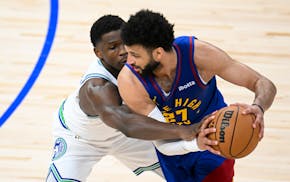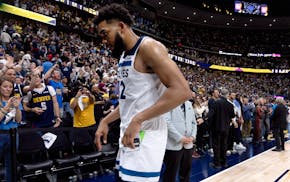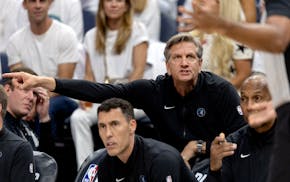FORT MYERS, FLA. - It's mid-March and the race of the reluctant Minnesota stars is on:
Who'll make a commitment first? Back-and-Forth Brett Favre or Jockeyin' Joe Mauer?
Mauer still has more leverage than Pat Williams on a teeter-totter, but as negotiations have lagged, Mauer's hesitancy to accept a record-setting contract offer from his hometown team has made his signing less than a sure thing and raised this previously unthinkable question:
"Won't the Twins have to trade him if he refuses their best offer?"
A deal between the All-Star catcher and the Twins is still more likely than not, and at any moment Mauer's agent, Ron Shapiro, could call the team and make it happen, prompting a combination press conference/Minnesota Mardi Gras.
But a combination of modern baseball logic and Twins history suggests that if the Twins' decision-makers can't sign Mauer, they will be obligated to trade him.
The Twins and Shapiro have kept the details of their negotiations remarkably quiet, but my sense, after talking with a variety of people, is that the team has offered more than $20 million a year. If Shapiro is intent on pushing Mauer to $25 million or more a year, Mauer might find himself on the Johan Santana Shuttle out of town.
A trade could yield a closer to replace Joe Nathan and would protect the franchise in the future from having one player on their roster consuming 20 to 25 percent of their payroll, a formula that rarely works in baseball.
The idea of trading Mauer may seem ridiculous to those who wear his jersey while mailing him marriage proposals. The Twins are about to enter Target Field with Mauer as their centerpiece, a homegrown, reigning MVP with a wholesome reputation who has helped the franchise peak in popularity.
Until spring training started, the onus was on the Twins to lock up Mauer before he and the team would be forced to deal with the awkwardness of the most-scrutinized negotiations in franchise history playing out as the team prepares for the season.
Once the Twins began making huge offers, though, the onus switched to Mauer.
If he's spurning amounts the Twins feel are exorbitant, the team could discern that Mauer is intent on playing in New York or Boston. Those might be the only two baseball cities where a team other than the Twins would be willing to pay more than $20 million a year for a catcher with a history of leg and back injuries.
Shapiro is famous for keeping two clients -- the Twins' Kirby Puckett and the Orioles' Cal Ripken Jr. -- in one city for their entire careers. But he didn't accept hometown discounts. Both players set monetary records when they re-signed.
Twins players and officials hoped that the Mauer negotiations would be different, that Mauer would crave playing for the Twins at Target Field, and with his buddy Justin Morneau. In the Twins clubhouse, he is surrounded by players who eagerly signed long-term deals, including Morneau, Michael Cuddyer, Nick Blackburn, Scott Baker and Nathan.
Last summer, when talking about Mauer's future, Morneau and Mauer both made two points:
1) That they weren't trying to extract every last dollar from the Twins. "We've already got all the money we're ever going to need," Morneau said then.
2) That Mauer would be encouraged to re-sign if the Twins' front office demonstrated a commitment to building a championship club.
Since then, the Twins front office has excelled, making moves that propelled the team into the playoffs last summer and acquiring three former All-Stars -- J.J. Hardy, Orlando Hudson and Jim Thome -- this winter.
Tuesday in the Twins spring training clubhouse, Mauer was his usual polite, friendly self, but the circumstances around him have changed. On a team intent on opening Target Field with a championship, Mauer is the Twins' last internal distraction.
Once known for reserve bordering on shyness, Mauer this winter became the subject of ESPN's "Homecoming" special, appeared in commercials in which he refers to himself in the third person, and signed a marketing, endorsement and sponsorship deal with the powerful IMG agency. "It was a little different, I guess," Mauer said. "For all the things I said 'Yes' to, I had to say 'No' to a lot, too. I think my mentality going into the offseason didn't change. I still got to get my work in and prepare for the season."
Morneau was also a quiet young player who emerged from his shell after winning an MVP Award, but he was surprised by Mauer's visibility this winter. "I didn't expect that out of him," Morneau said. "You want to take advantage of those opportunities when you get them, but at the same time, you don't want to be everywhere. That's not really the Minnesota way -- humble, and all that kind of stuff.
"And he is. He hasn't changed in that way at all. But he's gotten his opportunities and he's taken advantage of them, which is good. He's still the same guy."
A public relations expert would urge the Twins to sign Mauer at any cost. A statistician or scout might argue that he might never duplicate his remarkable 2009 season, that he has been plagued by injuries, that the Twins are high on catching prospect Wilson Ramos, that the franchise might be better off spending the $200 million it might take to sign Mauer on a handful of other players.
If the Twins signed Mauer to a deal worth $25 million a year -- which might be what it takes -- what might they have to pay to keep Morneau, who was considered the more valuable player until last season?
Would the Twins be willing to make the most unpopular move in franchise history, and trade Mauer?
Look at it from their perspective. The franchise has survived the early retirement and subsequent death of Puckett; eight consecutive losing seasons in the '90s, $20 million payrolls; the trade of Johan Santana; their owner volunteering the franchise for contraction; and Lew Ford.
At some point, the Twins' attitude will change from eagerness to sign Mauer, to indignation that he won't accept a franchise-record offer.
The worst scenario for the Twins would be watching Mauer leave in free agency. That would be far more damaging to the franchise than a productive trade of even their most popular player.
Jim Souhan can be heard at 10-noon Sunday on AM-1500. His Twitter name is SouhanStrib. • jsouhan@startribune.com

Souhan: KAT shows his all-around game to get Wolves to Game 7

Souhan: Anyone got a nickname for this smothering Wolves defense?

Souhan: Blow up Wolves if they lose tonight? No, and here's why

Souhan: Edwards inaccurate, ineffective in biggest game of career



